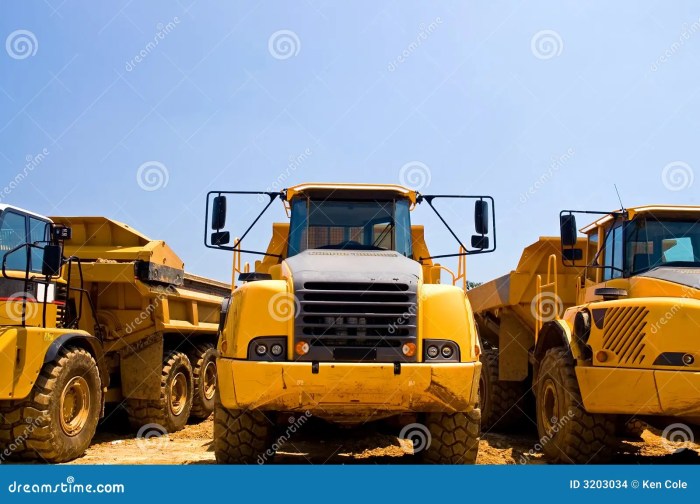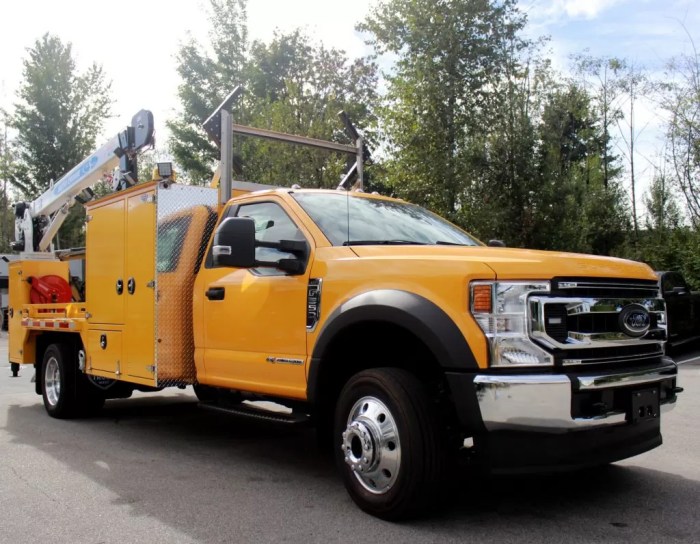Construction trucks for heavy duty work are essential in the construction industry for their robust capabilities. From dump trucks to cranes, these vehicles play a crucial role in heavy duty tasks. Let’s delve into the world of construction trucks designed for the toughest jobs.
Overview of Construction Trucks for Heavy Duty Work

Construction trucks play a crucial role in heavy duty work, providing essential support for various construction tasks. These trucks are specifically designed and equipped to handle tough conditions and heavy loads, making them indispensable in the construction industry.
Types of Construction Trucks
- Bulldozers: These powerful machines are used for earthmoving, leveling terrain, and pushing heavy materials.
- Excavators: Ideal for digging trenches, foundations, and lifting heavy objects, excavators are versatile construction trucks.
- Dump Trucks: Designed to transport materials such as soil, gravel, and debris, dump trucks are essential for moving large quantities efficiently.
- Cranes: Used for lifting and moving heavy materials and equipment, cranes are indispensable in construction projects that require vertical lifting.
Key Features of Construction Trucks
- Heavy-Duty Construction: Construction trucks are built with robust materials to withstand the rigors of heavy duty work, ensuring durability and longevity.
- Payload Capacity: These trucks have high payload capacities to carry large quantities of materials, making them efficient for transporting heavy loads.
- Specialized Attachments: Many construction trucks come with specialized attachments such as buckets, blades, and booms, allowing them to perform a wide range of tasks.
- Powerful Engines: Equipped with powerful engines, construction trucks have the necessary horsepower to tackle demanding construction projects effectively.
Types of Construction Trucks
Construction trucks come in various types, each designed for specific heavy duty tasks. Let’s explore some common construction trucks used in the industry.
Dump Trucks
Dump trucks are essential for transporting loose materials such as sand, gravel, or dirt at construction sites. These trucks have a hydraulic lift that allows the cargo bed to be raised and emptied at the desired location.
Ensuring construction safety guidelines for workers is essential in any construction project. By providing proper training, safety equipment, and regular inspections, workers can perform their tasks without compromising their well-being. Prioritizing safety not only protects the workers but also enhances overall project success.
Cement Mixers
Cement mixers are used to transport and mix cement, water, and aggregates to create concrete on-site. These trucks have rotating drums that keep the concrete mixture in motion to prevent it from hardening during transport.
Cranes
Cranes are crucial for heavy lifting tasks in construction projects. They are used to hoist and move heavy materials and equipment to different levels of a building or across the construction site. Cranes come in various types, including tower cranes and mobile cranes.
When it comes to construction project scheduling and planning , it is crucial to have a well-organized timeline to ensure the smooth progress of the project. By following the right guidelines and implementing effective strategies, the construction process can be streamlined for efficiency.
Key Features and Components
Construction trucks designed for heavy-duty work are equipped with a range of key features and components that enable them to tackle challenging tasks efficiently and effectively.
Reinforced Chassis, Heavy-Duty Tires, and Powerful Engines
- Reinforced Chassis: Construction trucks have a robust chassis that can withstand the heavy loads and rough terrains encountered in construction sites.
- Heavy-Duty Tires: These trucks are equipped with durable and heavy-duty tires that provide traction and stability on uneven surfaces.
- Powerful Engines: Heavy-duty construction trucks are powered by high-performance engines that deliver the necessary horsepower and torque to haul heavy materials and equipment.
Hydraulic Systems, Lifting Mechanisms, and Safety Features
- Hydraulic Systems: Construction trucks feature advanced hydraulic systems that enable functions like lifting, dumping, and maneuvering heavy loads with precision.
- Lifting Mechanisms: These trucks are equipped with specialized lifting mechanisms such as cranes, buckets, or booms that facilitate material handling and construction tasks.
- Safety Features: Heavy-duty construction trucks come with a range of safety features including rollover protection, backup cameras, and advanced braking systems to ensure the safety of operators and workers on the job site.
These key features and components play a crucial role in enhancing the efficiency and effectiveness of construction trucks for heavy-duty work. By providing durability, power, precision, and safety, these trucks enable construction companies to complete projects on time and within budget, while ensuring the safety of their workers and equipment.
Maintenance and Safety Practices
Regular maintenance and following safety protocols are crucial to ensure construction trucks are in optimal condition for heavy duty work.
Regular Maintenance Procedures
Regular maintenance is essential to keep construction trucks performing at their best. This includes:
- Checking fluid levels such as oil, coolant, and hydraulic fluids regularly.
- Inspecting tires for wear and proper inflation to ensure safe operation.
- Replacing filters and conducting regular tune-ups to maintain engine efficiency.
- Greasing moving parts to prevent excessive wear and tear.
Safety Protocols and Best Practices, Construction trucks for heavy duty work
Safety should always be a top priority when operating construction trucks for heavy duty tasks. Operators should:
- Wear appropriate personal protective equipment (PPE) such as helmets, gloves, and safety boots.
- Follow all manufacturer guidelines and safety instructions for the specific construction truck being used.
- Ensure proper training and certification for operating heavy machinery.
- Regularly inspect the construction site for potential hazards and address them promptly.
Tips for Longevity and Reliability
To ensure the longevity and reliability of construction trucks used in heavy duty construction projects, consider the following:
- Implement a preventive maintenance schedule to address issues before they become major problems.
- Keep detailed records of maintenance and repairs to track the truck’s performance and identify any recurring issues.
- Store construction trucks in a covered area when not in use to protect them from the elements and prevent corrosion.
- Regularly clean construction trucks to remove dirt and debris that can cause damage over time.
Concluding Remarks

In conclusion, construction trucks for heavy duty work are indispensable for ensuring efficiency and safety on construction sites. With their specialized features and components, these trucks are key players in completing challenging projects successfully.